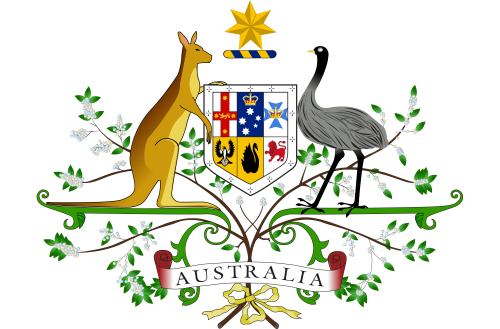 Australian Government Logo PNG
Australian Government Logo PNG
The Commonwealth Coat of Arms is the official name of the coat of arms of Australia, which is, basically, the Australian Government logo.
Meaning and history
The Australian Government, a unique blend of inherited British parliamentary traditions and homegrown innovations, has evolved significantly since the federation of its six colonies in 1901. Initially, the newly formed Commonwealth of Australia closely mirrored the British system, but over time, it developed its own distinct political identity.
Key milestones in the Australian Government’s history include the adoption of the Australian Constitution in 1901, which established a federal system of government and outlined the roles of its three branches: the Parliament, the Executive, and the Judiciary. The Parliament of Australia, bicameral in nature, consists of the House of Representatives and the Senate, representing the people and the states respectively.
Significant developments occurred post-World War II, with Australia’s increased autonomy from Britain. The passage of the Australia Act 1986 marked a pivotal moment, ending the British Parliament’s ability to legislate for Australia and abolishing appeals to the British Privy Council, thereby cementing Australia’s legislative independence.
Throughout its history, Australia has been a pioneer in social reform. It was one of the first countries to grant women the right to vote and to be elected to national office, doing so in 1902. Moreover, the government’s policies have evolved to reflect the nation’s growing multicultural fabric, especially after the dismantling of the White Australia Policy in the mid-20th century.
In recent decades, the Australian Government has grappled with issues like indigenous rights, environmental conservation, and its role in global affairs. Debates over immigration, climate change, and Australia’s relationship with the Asia-Pacific region continue to shape its political landscape.
What is Australian Government?
The Australian Government is the federal authority of Australia, a parliamentary democracy and a constitutional monarchy. It operates under a federal system, dividing powers between the federal government and states/territories.
1908
The country received its original coat of arms from King Edward VII. It looked by far plainer than the following version, although it still had multiple details. In the center, you could see a shield in white and blue housing the cross of St George. Also, there were five six-pointed white stars and six smaller shields.
One more star, this time with seven points, could be seen above the shield. It was the so-called star of the Federation. To the left of the shield, there was a kangaroo, while to the right, an emu could be seen. Eventually, there was a white banner housing the lettering “Advance Australia.”
1912
The second version was granted by King George V. It was more intricate and by far more difficult to decipher than the original. Nevertheless, the structure remained unchanged.
The shield in the middle (escutcheon) now comprises six smaller shields, each with an independent coat of arms. The reason why the country needed a new coat of arms was that the previous one did not represent the states.
The escutcheon comprises the following logos:
- coat of arms of New South Wales (the cross of St. George housing four seven-pointed gold stars and a gold lion in the very center)
- coat of arms of Victoria (St Edward’s Crown and Southern Cross – this part is dominated by dark blue mimicking the color of the night sky)
- coat of arms of Queensland (the combination of a blue Maltese cross and St Edward’s Crown, which is placed right in the middle of the cross. The background is white)
- coat of arms of South Australia (the Australian piping shrike, the emblematic bird that appears on the state’s flag. The background is yellow)
- coat of arms of Western Australia (a black swan, which is a waterbird, whose habitat includes the southeast and southwest regions of Australia. The background is yellow)
- coat of arms Tasmania (a red lion over the white background)
The kangaroo and the emu remain prominent figures on this version of the Australian Government logo. They look more true-to-life here.
Font
The banner in the lower part of the logo features the lettering “Australia” in a refined and old-fashioned sans serif typeface.
Colors
The country’s official colors are green and gold. While various shades of gold dominate the design, green can hardly be seen there.









